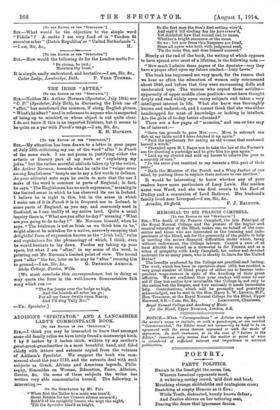[To THE EDITOR OF THE "Brion/014'1
Sra,—My attention has been drawn to a letter in your paper of July 18th criticizing my use of the word " after" in Punch of the same week. I am not prone to justifying either the artistic or literary part of my work or " explaining my jokes," but the rather scornful attitude taken up by the writer, Mr. Arthur Norman, towards what he calls the "vulgar error among Englishmen" tempts me to say a few words in defence. As your editorial note says, he omits to note that the use I make of the word is common in parts of England ; in fact, he says, " The Englishman has no such expression," meaning in the limited sense in which he has observed its use in Ireland. I believe he is right in this, but in the sense in which I make use of it in Punch it is in frequent use in Ireland, in some parts of England, as you say, and commonly used in Scotland, as I can testify of my native land. Quite a usual inquiry there is, "What are you after to-day ?" meaning "What are you going to do to-day ? " Mr. Norman himself, when he says, " The Irishman is not so Irish as we think him to be," might almost be mistaken for a native, narrowly escaping that delightful form of expression known as the "Irish bull," roles and regulations for the phraseology of which, I think, even be would hesitate to lay down. Pardon my taking up your space, but what I am " after," in my sense of the word, is pointing out Mr. Norman's limited point of view. The bound goes " after " the fox, later on he may be "after " running him [We must conclude this correspondence, but in doing so may quote the lines in the well-known Somersetshire folk song which run :-
" The fox jumps over the hedge so high, And the hounds all arter 'un go; For all my fancy dwells upon Nancy, And I'll sing Tally Ho !"
Spectators]


































 Previous page
Previous page